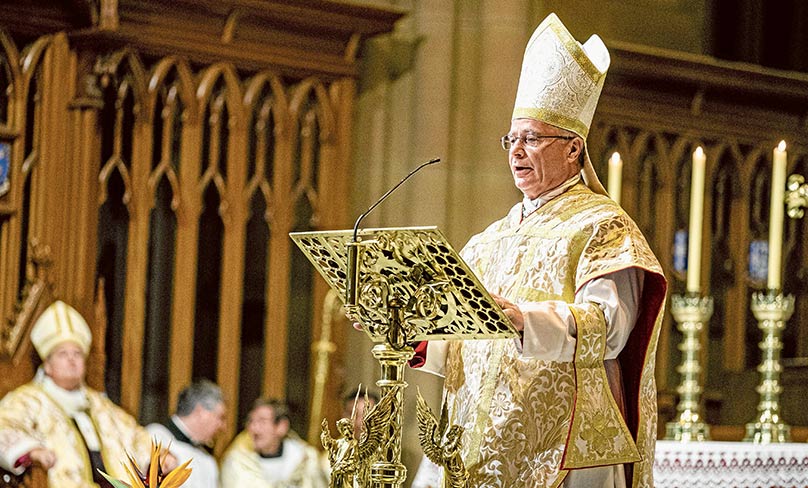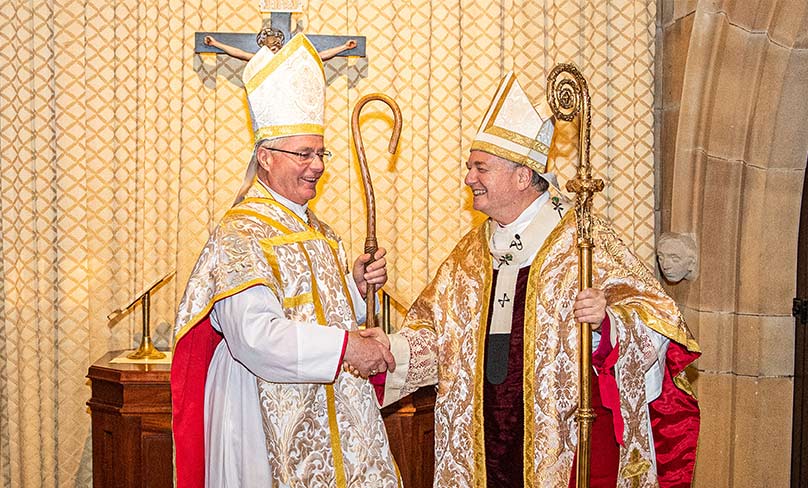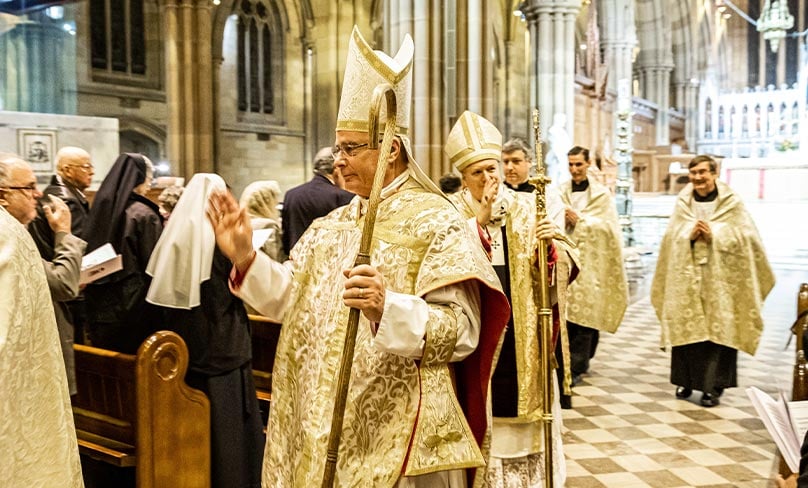
A more traditional form of liturgy which motivates or encourages the laity to discover the riches of the Catechism, which in turn creates a better formed layman or laywoman are among the hoped-for benefits of the Personal Ordinariate of Our Lady of the Southern Cross, says its new head in Australia.
Monsignor Carl Reid, who was installed as the new head of the Ordinariate at St Mary’s Cathedral on 27 August, is a former member of the Anglican Church of Canada, a bishop in the continuing Anglican Catholic Church of Canada, and was received into the Catholic Church, in 2012.
The following year he was ordained a priest in the Ordinariate of the Chair of St Peter (which covers the US and Canada). As the new Ordinary he is now a member of the Australian Catholic Bishops Conference, without actually being a bishop.
What was it that drew you to the Church of Rome?
A perhaps trite answer would simply be “history.” But it’s not far off the truth. After a brief hiatus from Anglican church attendance while I was studying engineering in university, upon my return, which was aided by a flash insight not unlike a certain Apostle’s experience on the road to Damascus, I was imbued with a thirst for historical knowledge as regards the Church.
Initially, I focused on the history of Anglicanism, only very quickly to discover that, if one intends to be honest in that regard, one must necessarily go back much further than 1534.
And that was powerfully convicting. That this coincided chronologically (1977) with the accelerated departure of Anglicanism from its cusp-like position between Reformed Protestantism and its tenuous Catholic roots only emphasised the recognition that to be separate from Rome was to be separate from the true One, Holy, Catholic and Apostolic Church.
It was fortuitous that I was living in a city where other like-minded Anglicans thought it both worthwhile and important to attempt some sort of corporate return to ‘Mother Ship’. Twenty-two years later: Anglicanorum coetibus [came along].
In your experience how has the Ordinariate generally been received in the Catholic Church? What do you see as its prospects, particularly here in Australia?
Generally our reception has been very welcoming indeed, though there are undeniably geographies and dioceses where we are viewed, well, suspiciously.
Some feel we are still Anglican, not helped by the persistent and quite incorrect reference to us as “the Anglican Ordinariate.”
We are not Anglican; we are fully Catholic.
As to our future prospects, on a somewhat microscopic scale, they very much mirror the rest of the Catholic Church: ageing priests, not always with a viable succession plan in place. Still, as we pray for vocations, we are seeing encouraging signs.

The Ordinariate Missal (approved in 2015) is quite beautiful. Does it bear any resemblance to the old Sarum rite, in use in pre Reformation England?
While there are recognisable roots in the Sarum rite, they are that by backwards extension.
Which is to say, some of the beautiful, sacramentally sound Book of Common Prayer prayers in hieratic or sacral English that we have brought into the Catholic Church in the Missal, as invited to do so by Pope Benedict XVI in Anglicanorum coetibus, are certainly English translations of Latin Sarum rite prayers, or in some cases, slightly redacted translations from Latin into so-called Tudor English.
Bishop Lopes, the US Ordinary, favours clerical celibacy, as an ultimate option, as this is the norm in the Roman Rite. Do you see this coming, or will we see greater use of married clergy?
Anglicanorum coetibus is very clear in terms of clerical celibacy being the norm. All seminarians fall into that category.
The only possible future married priests would be currently married Anglican clergymen who petition to become Catholic priests.
Then, as was the process for those of us who fell into that category, we first become Catholic laymen, undergo a process of formation, which might include focused time at seminary, and then may be accepted as candidates for the Catholic priesthood.
The Church clearly faces an increasingly problematic culture of modernity which is indifferent to God and the divine and seemingly fixated on radical personal autonomy and moral relativism at the expense of the common good. Many people are much more hostile to the Church than they were only two or three generations ago. Is Christianity dying away?
That’s a thesis topic! To be sure, as Pope Benedict warned us, the dictatorship of relativism strews the pathway for any Christian with powerful distractions, leading too often to a type of cafeteria style Catholicism/Christianity.
Still, I see encouraging signs in the western world: many devout, young Catholics who know and take the Catechism seriously; traditional monastic orders beginning to attract young novices. They will ensure the continuation of the Church. “The gates of Hell shall not prevail…”

In the light of these problems, (alluded to by Pope Benedict XVI in his references to a spiritually exhausted Western Christianity) what can the Ordinariate offer the whole Church?
I could be on somewhat shaky ground here, so I must answer carefully. Our traditional form of the Liturgy seems naturally to lead to a culture in which the laity seem impelled to dive back into their Catechisms.
This in turn, leads them to a better understanding of sacramental theology – thinking here of the frightening survey in the US last month that revealed that a significant majority of Catholics there don’t understand Transubstantiation, and therefore do not believe in the Real Presence.
If we can be of any help in restoring the faithful in the wider Church to a better understanding of that which the Church has always believed and continues to teach, then our presence will be of some importance.
What have been you and your wife’s impressions of your new country?
Well, thank goodness English is spoken here. That eases somewhat getting used to driving on the other side of the road.
We’ve been made to feel so welcome that my wife has commented several times that it really doesn’t feel all that different. Of course, we haven’t got yet to the 40C summer weather …
